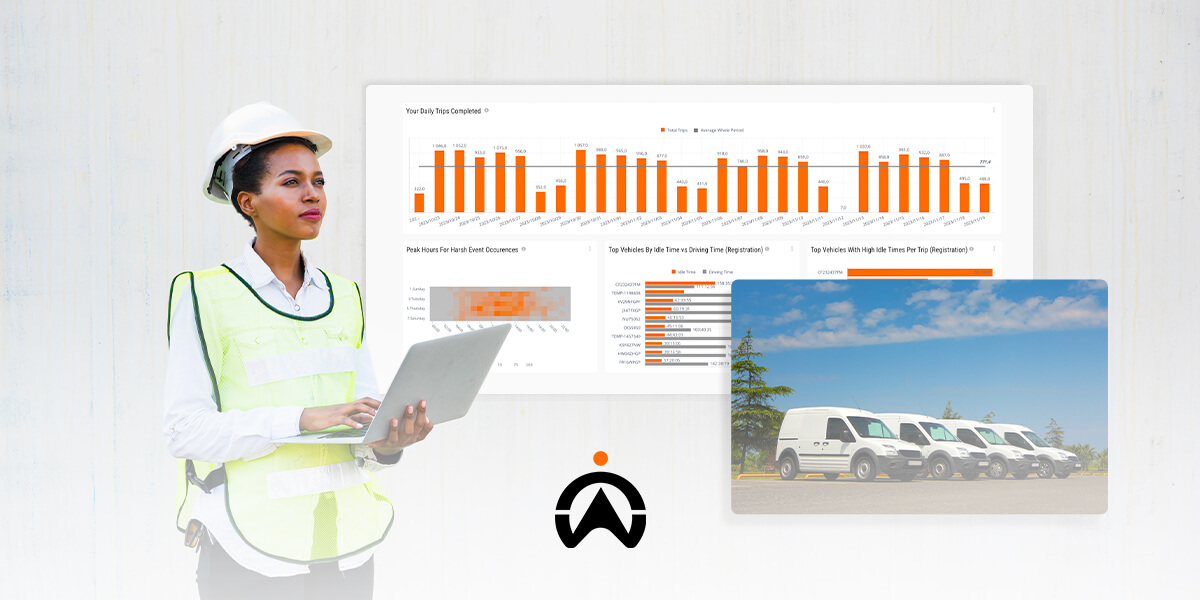- Solutions
- The Company
- About usCartrack offers smart fleet solutions guaranteed to optimise your fleet and workforce, no matter how big or small your business.
- Investor RelationsCartrack has a history of strong cash flow generation and cash conversion, low financial leverage and strong dividends.
- CareersCareers portal. View all the current Cartrack career openings and opportunities available.
- Resources
- Contact Us
- Bahasa
- Login
Data-Driven Decision-Making In Fleet Management

---- 2024/01/04 ---
What is Data-Driven Decision Making?
Data-driven decision making is the use of data and analytics to guide decision making. When used in fleet management, data-driven decision making involves collecting, analyzing, and interpreting data from a variety of sources, including vehicle performance records, driver behavior reports, and maintenance records. This information helps identify trends, patterns, and insights that can inform future business decision-making processes.
Various Types of Fleet Data
Fleets have a variety of information that can be collected and analyzed. Some of these include:
- Location data: Using IoT devices and GPS coordinates, fleet managers can view the historical movements of their fleet vehicles and monitor movements in real-time.
- Driver behavior data: This data provides insights to fleet managers about how drivers are operating their vehicles. This includes compliance with speed limits, aggressive driving, acceleration and braking habits, and overall driver behavior behind the wheel.
- Telemetry data: This data provides insights to fleet managers about various vehicle metrics, including speed, fuel consumption, engine performance, and mileage, and many more.
- Maintenance data: This data provides insights to fleet managers about the condition of their vehicles and provides a complete maintenance history.
- Safety data: This data provides insights to fleet managers about vehicle safety incidents, including accident reports.

The Role of Telematics in Collecting Fleet Data
Telematics is a highly intelligent computer that consists of a GPS tracking unit and onboard sensors. This technology works together to monitor and report the status and overall activities of fleet drivers.
Telematics is essential for fleet data collection by enabling the integration of telecommunications and information technology to collect, transmit, and analyze data from multiple vehicles.
For an effective telematics system, the following parts need to be integrated:
- Global Positioning System (GPS) satellite technology: The integration of GPS in telematics is to accurately determine and track the location of vehicles in real-time.
- Wireless networks: Wi-Fi and various cellular networks (e.g., 4G LTE or 5G) facilitate the transfer and storage of data from vehicle GPS tracking devices via internet or satellite connectivity.
- Sensor-based monitoring: Integrating sensors with telematics into fleet management software and provides fleet managers with in-depth insights into fleet operations. For example, the use of temperature sensors in cold chain logistics. By using temperature sensors, the system can monitor temperature in real-time and alert fleet managers when there is a detection of temperature fluctuation, so they can immediately communicate with drivers to address issues such as sending a replacement trailer if necessary.
How Telematics Works to Collect Fleet Data?
Telematics works in the following way:
- Collects data based on the location of the vehicle and movements through GPS tracking devices installed in the vehicle.
- Transfers the collected data through a secure cellular network.
- Visualizes vehicle data and information such as vehicle location, engine status (e.g., on/off or idle time), and driver behavior using a fleet management software platform (web-based or app).
Benefits of Data-Driven Fleet Management
Data-driven fleet management can provide a number of benefits for businesses, including:
- Improved efficiency: By using data to identify areas for improvement, businesses can make their fleets more efficient. This can lead to reduced costs, improved fuel efficiency, and increased productivity.
- Increased safety: Data can be used to identify risky driving behaviors and take steps to mitigate these risks. This can help to reduce accidents and improve driver safety.
- Enhanced compliance: Data can be used to track compliance with regulations, such as hours of service and safety regulations. This can help businesses to avoid costly fines and penalties.
- Improved customer service: Data can be used to better understand customer needs and preferences. This can help businesses to improve the customer experience and increase customer satisfaction.
Why Data-Driven Decision Making is Important for Fleet Management
Here are three reasons why data-driven decision making can help fleet managers improve the efficiency of their fleets:
Maximizing fleet safety
Data-driven decision making plays a critical role in maximizing safety by leveraging real-time data to inform and improve safety practices among drivers and fleet operations. This is done through:
- Identifying risky driving behavior: Telematics provides fleet managers with a variety of data that can be analyzed to identify risky driving behavior. By monitoring this behavior and identifying patterns, managers can implement measures to avoid the risk of accidents during trips.
- Preventative maintenance: Data analysis helps fleet managers proactively identify potential maintenance issues before they become a safety hazard, resulting in cost savings and increased fleet lifespan. This significantly reduces the likelihood of damage and accidents caused by mechanical failure, keeping drivers safe.
Driving cost savings
Cost savings require fleet data and its judicious use to make efficient decisions.
- Fuel monitoring: Fuel monitoring systems are fleet management cost management systems that provide real-time insights into all fleet fuel costs and consumption. Fuel monitoring helps businesses identify where fuel costs are being spent (for example, fuel theft). Accurate data allows fleet managers to proactively address potential issues, thus eliminating fuel waste.
- Asset tracking: Leveraging asset tracking software helps understand the condition of vehicles. Know which assets are profitable and which are spending more than they should, thus helping businesses use the right vehicles for the right jobs. This insight can help in making decisions based on information on which assets to sell and which need more, helping to run a more efficient, safe, and cost-effective fleet.
Improving customer satisfaction
The quality of service provided to customers can significantly impact a business. Data-driven decision making aims to improve this through:
- Route optimization: Route optimization can have a positive impact on both businesses and customer service. By helping to optimize the fastest routes for drivers, businesses can make deliveries that are more on time and save fuel.
- Proactive communication: By using data insights, fleets can anticipate potential delays or challenges in advance. By simplifying communication between drivers and fleet managers, real-time job updates are provided. This drives proactive delivery communication with customers, building trust and effectively managing customer expectations.
Data is just numbers unless it can be turned into something that can be used to solve fleet challenges. With the insights listed above, a fleet can get performance assessment and real-time monitoring, helping them make informed business decisions to achieve operational efficiency.
The Dangers of Not Making Data-Driven Decisions in Fleet Management
Fleet management encompasses the oversight of company vehicles as a means to ensure safety, cost savings, and overall efficiency.
If a fleet does not make data-driven decisions, they may face the following challenges:
- Inefficient operations: Without data-driven insights into routes, vehicle usage, or maintenance schedules, a fleet will experience higher operating costs.
- Safety risks: The absence of an effective monitoring system leads to the neglect of dangerous driving behavior, which increases the risk of accidents and safety violations within the fleet.
- Poor fuel efficiency: The inability to optimize driver routes and monitor fuel usage results in unnecessary increases in fuel costs and fuel waste.
- Customer dissatisfaction: By not looking at data related to deliveries in the past and not using it to optimize future deliveries, the fleet experiences delivery delays, which negatively impact customer satisfaction.
Making Smart Business Decisions with Data-Driven Fleet Management Solutions from Cartrack Indonesia
Making informed decisions is what separates success from uncertainty in the field of fleet management. Cartrack Indonesia understands this and brings businesses to leverage data-driven solutions that are sure to bring profits to the business.
Contact Cartrack Indonesia today













 Select Countries
Select Countries